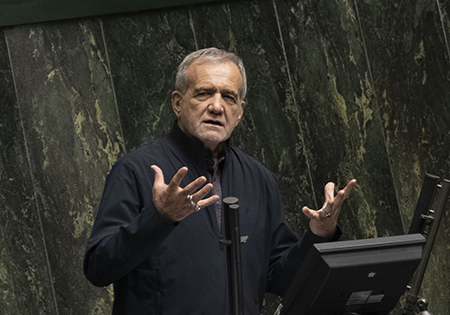"No one can solve this problem alone, but together we can change things for the better."
Iran Expresses Support for Diplomacy, U.S. Skeptical
September 2024
By Kelsey Davenport
Iran’s new president expressed support for nuclear diplomacy, but the Biden administration says it is looking for the new leadership in Tehran to take action to demonstrate that it intends to take a different approach to negotiations.

After taking office on July 30, Iranian President Masoud Pezeshkian expressed support for constructive engagement and said he would work to “remove the oppressive sanctions” targeting the country. He named Abbas Araghchi, one of Iran’s negotiators on the 2015 nuclear deal, as foreign minister.
Pezeshkian has denied that Iran has any interest in developing nuclear weapons, despite recent comments from senior officials suggesting Tehran will change its nuclear doctrine if the security environment changes or its nuclear facilities are attacked. (See ACT, May 2024.)
In a Tehran Times op-ed on July 12, Pezeshkian wrote that “Iran’s defense doctrine does not include nuclear weapons” and called for the United States to “adjust its policy.” He warned that Iran “does not and will not respond to pressure.”
U.S. State Department spokesperson Verdant Patel said in a July 29 press briefing that the United States still views diplomacy as the “best way to achieve an effective, sustainable solution with regards to Iran’s nuclear program” but “we are far away from anything like that.” The United States will judge Iran’s new leaders “by their actions, not their words,” he said.
Patel suggested that if Pezeshkian wants to “show seriousness or a new approach,” Iran could take some immediate actions, such as cooperating with the International Atomic Energy Agency (IAEA), rather than escalating tensions over various long-standing issues.
In June the IAEA Board of Governors censured Iran for failing to cooperate with a years-long investigation into past, undeclared nuclear activities. The IAEA is also pressing Iran to expand agency monitoring of the nuclear program. (See ACT, July/August 2024.)
Monitoring is particularly important because Iran is expanding its uranium-enrichment capacity and can produce weapons-grade nuclear material more quickly.
In response to the June censure, Iran informed the IAEA of plans to install additional cascades of advanced centrifuges at its enrichment facilities. The IAEA confirmed on June 28 that Iran installed four of the eight cascades planned for the Fordow Fuel Enrichment Plant.
In addition to the uranium-enrichment capacity expansion, an annual U.S. intelligence assessment for Congress of Iran’s proliferation risk released in July noted that Iran has “undertaken activities that better position it to produce a nuclear device.” The report did not offer details on those activities, but U.S. officials told The Wall Street Journal that Iran does not have “an active military nuclear program.”
In addition to Iran’s nuclear advances, regional tensions and Iran’s deepening relationship with Russia continue to complicate the prospects for renewed nuclear diplomacy.
Iran threatened to retaliate against Israel after Ismael Haniyeh, a senior Hamas official, was assassinated in Tehran on July 31 during a trip for Pezeshkian’s inauguration. Iranian officials said the response will be severe unless there is a ceasefire agreement for Gaza.
After Pezeshkian took office, Sergei Shoigu, the secretary of Russia’s security council, traveled to Tehran to meet with military leaders and the new president.
Following his visit, the United States expressed concern that Iran may be preparing to transfer ballistic missiles to Russia. Patel said the United States is prepared to deliver a “swift and severe response” if Iran provides Russia with missiles.
